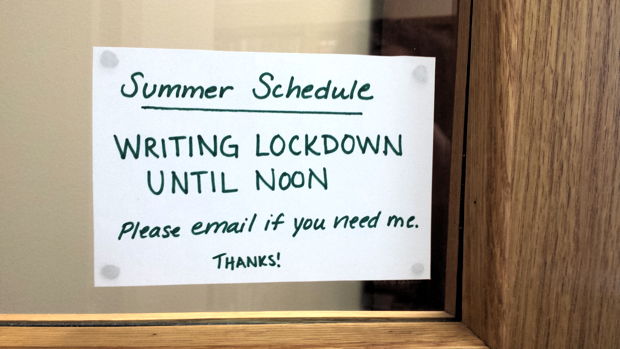
Summer hadn’t even started yet and I was already hyperventilating. For months, I had been mentally assigning projects to my wide-open summer — two book projects, getting an essay ready for publication, blogging, developing an online course, revising syllabi, planning new electives, reading widely. But as the school year neared its end and I actually took the time to open my calendar and make plans, I began to panic. By the time graduations and weddings, faculty meetings and academic conferences, camping trips and family reunions were blocked off, four full weeks had disappeared. Meanwhile, my to-do list had grown, now looking like a dinner plate at an all-you-can-eat buffet. How am I going to eat all that? What made me think I could get all this stuff done? Around that time, I overheard a colleague call May “meeting month” and felt the last shred of hope shrivel inside me. I nearly cried. More meetings?
This is my first summer as a full-time member of the faculty. Last summer I accepted the job and we made the major transition north to Canada. I had been thinking that this summer was mine to do with as I pleased. It began to be clear that this was not the case, at least not entirely. I struggled with letting go. I pondered why I feel compelled to write books when my institution does not require it of me. I wrestled with resentment over all the things I am required to do for which I feel unqualified or unmotivated. I felt my blood pressure rise every time a student in town for the summer wanted to schedule a lunch or coffee date with me. That’s when I knew something was really wrong. I love mentoring students. Why were they now feeling like an imposition?
Because I already felt robbed of the time I needed to get the job done.
That’s when I realized what I needed: boundaries. I needed to stop whining and stake out the time necessary to get the work done I feel called to do. And then set aside time to do the work I’d rather not do but must be done.
Here’s what I’ve learned: Yes, faculty members have a lot to do in the summer. But we also have a lot of unstructured time in which to get it done. I’m punching my way through that list like a champion with just one simple scheduling trick — a sign on my office door that reads:
Summer Schedule
WRITING LOCKDOWN
UNTIL NOON
Email if you need anything.
I’ve had very few morning interruptions, and I have long afternoons in which to take care of all the other things that must be done but aren’t my cup of tea. My goal is to write 750 words every morning. Because my current project is not very academic, most days I have no trouble reaching my goal.
With a chunk of writing done every morning, my heart is more hospitable in the afternoons. I can agree to meet someone for lunch, stop to talk with a faculty colleague, or attend a meeting without feeling squeezed. As I work on course profiles for the accreditation visit that will take place three years from now or rewrite program outcomes, I am buoyed by the joy of having done my best and most important work already. Then there’s the added joy of finishing unpleasant tasks so that I don’t have to do them later.
There are times when we have to let go of expectations of what we can accomplish. At other times, our stress levels derive more from a mental wrestling match than from reality. In my case, a small piece of paper was the main ingredient in finding equilibrium.
How about you? What must you do this summer? And what will it take to carve out the time you need to get it done? Maybe you can’t put a sign on your door. Maybe you have no office door to begin with! And maybe the most important thing for you will be to walk away from your desk and embrace a new rhythm of rest and play. Is there a simple solution that will enable you to be fully present in the areas where God has called you in invest?